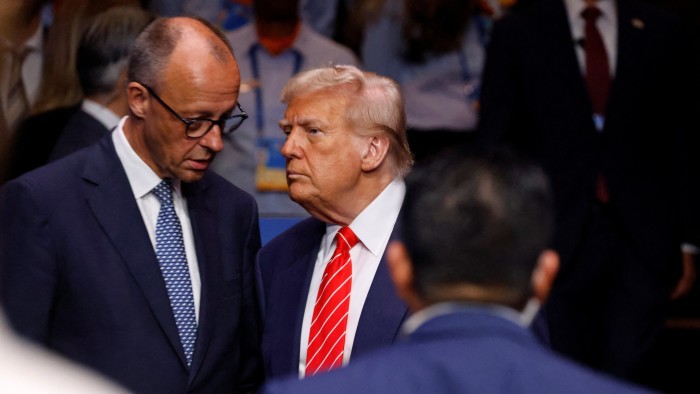Unlock the Editor’s Digest for free
Roula Khalaf, Editor of the FT, selects her favourite stories in this weekly newsletter.
Chancellor Friedrich Merz is “delusional” in his expectation that Germany’s car industry will be spared from US tariffs, according to EU officials involved in trade talks with the Trump administration.
Merz has been pressing the European Commission, which manages trade policy on behalf of the EU’s 27 member states, to sign a “framework” deal with Washington aping the US-UK agreement signed earlier this month, which included a special dispensation for cars.
But Brussels officials have privately told Berlin that such an arrangement would not be possible, as reducing German car imports is a big focus for US President Donald Trump, two people briefed on the discussions told the Financial Times.
Merz earlier this week criticised the commission for leading “too complicated” negotiations and said a deal should focus on four to five key industries, including automotive, steel and pharmaceuticals, where Trump has already threatened sectoral tariffs.
But commission officials say these are the hardest to remove because Trump wants to reshore these industries in the US and reduce imports.
EU negotiators believe that cars are “the hardest element” of any deal with the White House and must be handled after easier aspects have been agreed first to build trust, the people said.
Berlin was “delusional” to believe Trump would agree to concessions for German automakers as a first step, one of the officials said.
The disconnect between the EU executive and the bloc’s biggest economy came to fore at a leaders’ summit in Brussels on Thursday, where they were set to discuss the US trade relationship. Commission officials were hoping leaders would back a “credible threat” of retaliation to get the deal done by a July deadline.
“I support the Commission to quickly come to a trade deal with the US,” Merz said as he arrived at the summit.
Trump has threatened 50 per cent “reciprocal” tariffs on EU imports if no deal is struck by July 9.
Meanwhile so-called sectoral tariffs of 25 per cent for cars and car parts, and 50 per cent for steel and aluminium, are still in place — and so is a 10 per cent tariff on most other imports.

Several countries are wary of making too many concessions to get a quick deal. Referring to the UK-US agreement, one senior EU diplomat said that the bloc “should still hope that the EU with its 450mn people would have more trade power than the UK”.
A UK-style carve-out would be complicated for the sector if it involves a quota system. Trump agreed to cut a 27.5 per cent tariff on British cars to 10 per cent for the first 100,000 vehicles shipped from the UK. A similar deal for the EU would leave member states fighting over the allocation of the quota.
Another senior EU diplomat said that “the mandate we gave to the commission . . . was to go to the lowest tariffs possible”. They added that “10 per cent is not the mandate we gave,” referring to the UK, which accepted the 10 per cent levy on most goods to remain in place.
If the deal is “not balanced”, the diplomat said, the EU would be “ready to implement” counter tariffs.
The bloc has already agreed but suspended the application of retaliatory tariffs on €21bn of US goods and is preparing a further package targeting €95bn worth of American products.
Germany’s economy is dependent on exports and has been hit particularly hard by the tariffs. ACEA, the car industry body, said that carmakers were losing “single-digit millions” per day as a result. The German car industry accounts for about 5 per cent of the country’s GDP.
The US is the second-largest market for EU vehicle exports after the UK. In 2024, more than 750,000 cars were exported, valued at €38.9bn. The US exported 169,000 to the EU of €7.8bn value, according to ACEA.
Among German carmakers, BMW is particularly bullish that the US slashes its 25 per cent tariff from July. BMW chief executive Oliver Zipse told investors in mid-May that the company was able to negotiate with the Trump administration from a position of “strength” as the largest US automotive exporter by value last year, shipping 225,000 vehicles worth more than $10bn, from its plant in Spartanburg.
BMW, Mercedes-Benz and other European carmakers have pushed the US to allow a duty drawback programme, which would help them get refunds on import tariffs if they are also exporting vehicles from America.
Senior executives from the top three German carmakers met Trump at the White House in mid-April. Merz also broached the car issue with Trump when they met in the Oval Office earlier this month.
“I said that I drive an American car with a German brand,” Merz said after the meeting, by way of explaining to the US president that many German carmakers including BMW produced vehicles in the US before exporting them back to Europe.
While Merz has pressed the EU to reach a deal with the US as soon as possible, some German carmakers are less optimistic. “It’s a mixed bag at the moment,” one automotive official said. “At the end of the day, it is the EU that is negotiating with the US.”
Another person at a German carmaker said: “Negotiations seem to be a bit stuck. It is frustrating . . . that the EU is letting time pass.”



